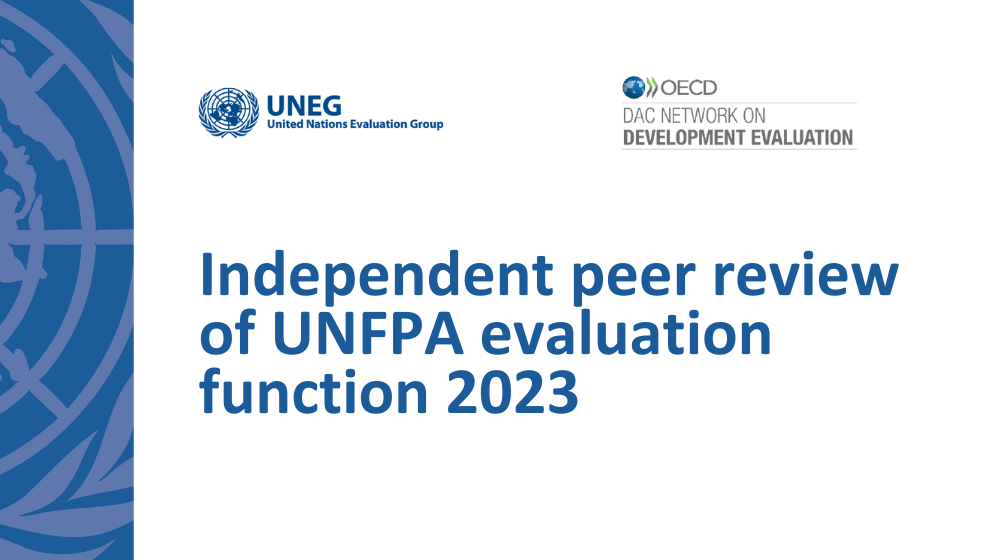
Independent peer review of UNFPA evaluation function 2023
Resource date: 07 Jul 2023

Resource date: 07 Jul 2023
In 2023, the UNFPA evaluation function was independently peer-reviewed, fulfilling a commitment in the Evaluation Policy 2019. The peer review was conducted under the provisions of the United Nations Evaluation Group (UNEG) and the OECD Development Assistance Committee (OECD DAC) Network on Development Evaluation.
The peer review assessed the evaluation function's adherence to UNEG norms of independence, credibility and utility. It also assessed the function’s relevance in a dynamic and fast-changing environment, and the adequacy of resources for an evolving evaluation function, working within the humanitarian-development-peace nexus. The peer review will inform the revision of the Evaluation Policy that will be presented at the Executive Board first regular session 2024.
The peer review panel was intergenerationally and geographically diverse, comprising six evaluation experts, including a young evaluator from Mexico, a parliamentarian from Sri Lanka, and evaluation experts from the UNHCR, UNICEF, the Swiss Agency for Development and Cooperation, and South Africa. This diversity is also a first amongst peer review panels in UNEG. The peer review panel conducted extensive interviews and consultations with UNFPA senior leadership, the Evaluation Office, the regional and country offices as well as external partners, including UNEG and Executive Board members.
The peer review found that the UNFPA evaluation function continued to strengthen since the approval of the 2019 Evaluation Policy. The evaluation function is highly valued in UNFPA and by the Executive Board for contributing to corporate-level strategies, enhancing programmes in UNFPA mandate areas, and informing country programme documents. The UNFPA evaluation function operates within a strong enabling environment, which provides a firm foundation for further strengthening the evaluation function. The Evaluation Office is respected across the organization for its professionalism and its added value in providing evaluative evidence to inform decision-making in UNFPA. Although relatively small, the evaluation function has cultivated a high profile in the United Nations development system through its commitment to system-wide, inter-agency and joint evaluations. However, the peer review also highlighted that the evaluation of humanitarian action needs more attention and there is potential to strengthen the relevance, quality and learning from decentralized evaluations.
The peer review highlighted four good practices, particularly on the role of headquarters divisions in building a culture of evaluation and learning; ring-fencing funds for country-level evaluations; development of high-quality products for evaluation communication and use; and youth engagement in evaluation.
The 11 recommendations of the peer review have been accepted by UNFPA. The peer review recommends strengthening evaluation coverage, improving the utility of evaluations, especially country and regional programme evaluations, and tracking the uptake of all evaluations. To bolster independence, the job classification and job descriptions of Evaluation Advisers in headquarters and regional offices, and country M&E staff, should be revisited. UNFPA should strengthen the evaluation quality assurance and assessment system and expand the coverage to all decentralized evaluations. For greater quality of country and regional programme evaluations, a higher budget threshold should also be established. There should be clearer coverage targets and standard costs for different types of evaluations including humanitarian. The synergies amongst the evaluation and audit function should be increased and institutional and human resource capacities for humanitarian evaluations should be strengthened. A clear theory of change should be developed for the national evaluation capacity development strategy.